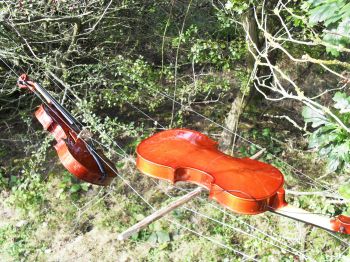When violins were trees
Wednesday 28 November 16:00 until 17:30
Attenborough Centre Creativity Zone (Pevensey 3C7)
Speaker: Bennett Hogg, Newcastle University
Part of the series: Masterclass Research Seminar

When violins were trees
For many years now I have been working with the idea that violins were once trees. From naïve early electroacoustic experiments designed to find “naturalistic” sounds through extended violin techniques, through a series of free improvisation projects, I have finally arrived at what I think of as a critical ecological practice with violins out in the natural environment. Dragging violins along paths, floating them in rivers, allowing rain to fall on them, and recording the results with small microphones hidden inside the bodies, I work in a participative way with the affordances of the environment, the instrument, and my own personal skills and memories. Conventional “soundscape” compositions and theories of acoustic ecology can, I argue, be seen to be neither particularly acoustic, nor particularly ecosystemic. Much environmental sound art ends up being simply representation, albeit in a sonic form. Against this, I argue for participation, refusing to hide the presence of the artist, but also resisting the idea of merely imposing an artistic vision onto the surface of an ecosystem.
Biography
Bennett Hogg is a composer, improviser, and cultural theorist who lives in Morpeth, Northumberland and teaches in the music department at Newcastle University, where he directs the AHRC-funded environmental sound art project "Landscape Quartet". He has taught in numerous institutions, developing projects at STEIM Amsterdam, EMS Stockholm, The Royal Opera House Covent Garden, Newcastle-Gateshead AV Festival, DeMarco European Art Foundation Edinburgh, and elsewhere. Much of his creative work has been in the field of electroacoustic composition, but he also composes for more “conventional” forces. He is currently writing a duo for bass flute and ten-string guitar for Malmö-based musicians Stefan Östersjö and Terje Thiwång, and recently completed a solo guitar and electronics piece for Magnus Andersson. He has worked for several years with John Ferguson and Will Edmondes (Gwilly Edmondez) in the Wormhole improvisation project featured on the Moscow-based web label Clinical Archives. His environmental sound art projects include collaborations with Berlin-based flautist Sabine Vogel, and Irish traditional flute player Desi Wilkinson. He publishes online and with Routledge, Oxford University Press, Cambridge Scholars Press, and is co-editing a special issue of The Contemporary Music Review with Sally Jane Norman, with whom he has run the “Music and Machines” research series at Newcastle University for the past six years. He is strongly committed to Christopher Small’s idea of “musicking” - that music should be a verb not a noun - and to Francesco J. Varela’s idea of “enactive consciousness, taking the view that both music and consciousness are things that we do, not things we have.
By: Matthew Knight
Last updated: Thursday, 1 November 2012

